|
|
|
Sort Order |
|
|
|
Items / Page
|
|
|
|
|
|
|
| Srl | Item |
| 1 |
ID:
135417


|
|
|
|
|
| Summary/Abstract |
The article discusses high-speed rail projects, focusing on the author's explanation of why the technology is not more pervasive across the world. Topics include a discussion of whether high-speed lines are built for speed or to increase capacity; a discussion of the conditions leading to the building of high-speed lines in some countries, but not others; and the history of the first high-speed railway in Japan.
|
|
|
|
|
|
|
|
|
|
|
|
|
|
|
|
| 2 |
ID:
136831
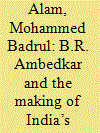

|
|
|
|
|
| Summary/Abstract |
B.R.Ambedkar occupies a special place in the development of constitutional democracy in Modern Asia. Born an untouchable he was sponsored by the progressive Maharaja of Baroda, India to improve his education. It was an assignment that the young Ambedkar accepted with gusto.
|
|
|
|
|
|
|
|
|
|
|
|
|
|
|
|
| 3 |
ID:
136833
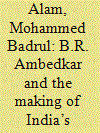

|
|
|
|
|
| Summary/Abstract |
B.R.Ambedkar occupies a special place in the development of constitutional democracy in Modern Asia. Born an untouchable he was sponsored by the progressive Maharaja of Baroda, India to improve his education. It was an assignment that the young Ambedkar accepted with gusto.
|
|
|
|
|
|
|
|
|
|
|
|
|
|
|
|
| 4 |
ID:
134525
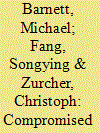

|
|
|
|
|
| Summary/Abstract |
There is considerable evidence that peacebuilding operations are more likely to reproduce important elements of the status quo than they are to propel post-conflict states toward a liberal democracy. In contrast to existing theories that focus on the resources available to peacebuilders or the degree of damage caused by the war to explain the outcome, we highlight the interaction between international and domestic actors. Specifically, we conceive of peacebuilding as a strategic process involving peacebuilders, a postwar government, and other local elites. The equilibrium results show that this process typically concludes in a compromised peacebuilding outcome. This is not surprising when the policy preferences of the actors diverge, but the results also hold when domestic elites prefer a liberal democracy to the status quo. Why? Primarily, because postwar governments are rewarded by relatively impatient peacebuilders with more resources than they would otherwise receive. Additionally, if there exists a secondary elite with veto power, a compromised outcome becomes even more likely. We illustrate these findings with reference to post-1989 peacebuilding operations. Although peacebuilding might not work as it is intended, in the conclusion, we argue that it is better than the alternatives and propose a more realistic measure of peacebuilding success.
|
|
|
|
|
|
|
|
|
|
|
|
|
|
|
|
| 5 |
ID:
134524
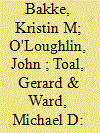

|
|
|
|
|
| Summary/Abstract |
De facto states, functional on the ground but unrecognized by most states, have long been black boxes for systematic empirical research. This study investigates de facto states’ internal legitimacy—people's confidence in the entity itself, the regime, and institutions. While internal legitimacy is important for any state, it is particularly important for de facto states, whose lack of external legitimacy has made internal legitimacy integral to their quest for recognition. We propose that the internal legitimacy of de facto states depends on how convincing they are to their “citizens” as state-builders. Using original data from a 2010 survey in Abkhazia, we examine this argument based on respondent perceptions of security, welfare, and democracy. Our findings suggest that internal legitimacy is shaped by the key Weberian state-building function of monopoly of the legitimate use of force, as well as these entities’ ability to fulfill other aspects of the social contract.
|
|
|
|
|
|
|
|
|
|
|
|
|
|
|
|
| 6 |
ID:
135284
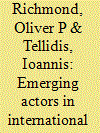

|
|
|
|
|
| Summary/Abstract |
Emerging actors in peacebuilding are generating a slow transformation of the norms and praxes of international peacebuilding, statebuilding, and development. Although each of the emerging donors have different contexts, approaches, motives, and methodologies, their power, influence, and—crucially— their nonadherence to the principles of the Development Assistance Committee of the Organisation for Economic Co-operation and Development have attracted scepticism and criticism from traditional donors. This article highlights the nuances of donors' engagement with peacebuilding and statebuilding. It examines whether they are critical or status quo states and what the implications are for practices of intervention.
|
|
|
|
|
|
|
|
|
|
|
|
|
|
|
|
| 7 |
ID:
136933


|
|
|
|
|
| Summary/Abstract |
The post-Soviet period in Russia has reached the quarter of a century milestone. The identity crisis widely acknowledged in post-Soviet research in its first two decades opened the way for policies aimed at the consolidation of an encompassing all-Russian (rossiiskaya) national identity1 as a source of nation-building. Contention over political separatism and various regional scenarios of the politics of identity2 are being superseded by the ‘Russian (russkii) question’. Meanwhile strengthening ethnic identities look up to religious, language and cultural landmarks as reference points. The nation-building agenda is thus having to take in different repertoires of contention, and bridging cleavages within Russian society is not only and not primarily a question of elite-tailored politics of identity. It is about the formation and assertion of inclusive identities innate both to the Russian cultural tradition and to the needs of a community confronting the challenges of modernisation.
|
|
|
|
|
|
|
|
|
|
|
|
|
|
|
|
| 8 |
ID:
135003


|
|
|
|
|
| Summary/Abstract |
This paper explores the origins of Cossack separatism in Kuban' during 1917. It investigates the growing tension between the Cossack caste and the civic universalism of the post-February environment, a setting which increasingly made Kuban' Cossackdom an anachronism, obliging Cossacks to search for a modern alternative group identity superseding the old estate one. The Kuban' Cossacks' answer was to justify Cossacks' estate particularism for the sake of ‘civic unity’ by implementing separatism in the name of ‘self-determination’. The result was the emergence of a Cossack nation-building movement during the civil wars, which pursued the separation of a Cossack state from Bolshevik Russia.
|
|
|
|
|
|
|
|
|
|
|
|
|
|
|
|
| 9 |
ID:
134518


|
|
|
|
|
| Summary/Abstract |
In recent years, courts in the Democratic Republic of Congo (DR Congo) have produced some of the most progressive judicial decisions against perpetrators of gender violence of anywhere in the world. Yet, DR Congo is often described as the archetypal collapsed state. This article uses a case study of domestic courts in Eastern DR Congo to analyze how and why complex functions of domestic governance—such as the production of frequent and high-quality judicial decisions by domestic courts—are able to persist, even flourish, in an area where the state is characterized by extreme fragility and weakness. I argue that, rather than a decoupling of law and practice as previous approaches might predict, state fragility in DR Congo has created openings for domestic and transnational actors to exert direct influence over judicial processes at multiple levels of governance. The involvement of external actors in the domestic authority structures of states has resulted in surprisingly progressive human rights outcomes in certain issue areas. However, the article also documents some of the unintended consequences of human rights developments that occur at the very peripheries of broader state-building projects.
|
|
|
|
|
|
|
|
|
|
|
|
|
|
|
|
| 10 |
ID:
134526
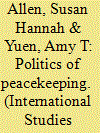

|
|
|
|
|
| Summary/Abstract |
Why are some peacekeeping mandates broad and expansive while others are narrow and well defined? Does variation in mandate flexibility reflect the needs inherent in resolving the conflict or the political interests of powerful states? The modern thread of debate surrounding UN action focuses on whether the political interests of the Permanent Five (P5) members in the Security Council or the stated goals of the institution as a whole drive UN behavior. While most analyses focus on where the UN intervenes to assess the political “pull” that member states exert on the institution, we examine variation in operational latitude across UN peacekeeping in war-torn states. Our analysis offers three main results. Powerful states do constrain international bureaucracies; however, bureaucratic independence varies with the intrinsic interests of the P5. Further, heterogeneity across powerful state preferences systematically affects bureaucratic flexibility in peacekeeping.
|
|
|
|
|
|
|
|
|
|
|
|
|
|
|
|
| 11 |
ID:
136836
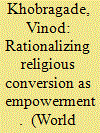

|
|
|
|
|
| Summary/Abstract |
The social fabric and cohesive social bond among the people is the foundation of any strong nation. The deliberate violation of one’s fundamental rights including religion lead towards the possibility of revolutionary explosion against the unified social fabric, especially when the nation is heterogeneous. In this context, Vice President of India expressed, “the global scene in modern times has been replete with complexities and tensions of what has been called the national question.
|
|
|
|
|
|
|
|
|
|
|
|
|
|
|
|
| 12 |
ID:
137140


|
|
|
|
|
| Summary/Abstract |
In the post-cold war era, liberal statebuilding interventions have become a major tool of global governance. Yet, the variation in outcomes is still poorly understood. This article draws on state formation theory to elaborate a causal mechanism that can explain the successful monopolization of the means of violence in statebuilding interventions. Insights from the state formation literature suggest that the regional political system is crucial for state formation and statebuilding. In order to test the hypothesis, a novel process-tracing method is applied to the case of Sierra Leone. The case study suggests that only a cooperative regional setting enables interventions to succeed
|
|
|
|
|
|
|
|
|
|
|
|
|
|
|
|
| 13 |
ID:
136464
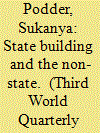

|
|
|
|
|
| Summary/Abstract |
This article unpacks the relationship between state building and the non-state. While accepting both the positive and corrosive characteristics of non-state actors and informal practices of governance, it attempts to (1) advance an argument in favour of mainstreaming ‘non-state’ forms that are positive and useful for state building; and (2) highlight the tensions between the practice of state building and the reality of the non-state. In thinking beyond the state and non-state dichotomy, the article seeks to identify factors that are necessary if state-building programmes are to work in complex environments. Drawing on received wisdom from recent experiences, this conceptual study focuses on important contextual, local, political and legitimacy issues to highlight prominent dilemmas. The conclusion suggests four policy-relevant lessons that reinforce the argument in favour of mainstreaming the non-state agenda into the critical thinking about security and development.
|
|
|
|
|
|
|
|
|
|
|
|
|
|
|
|
| 14 |
ID:
136851
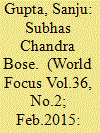

|
|
|
|
|
| Summary/Abstract |
It is difficult to conjecture which way and how much longer the Indian freedom movement might have swayed, had it not been for the pivotal role so conspicuously played by Netaji Subhas Chandra Bose, one of the greatest freedom fighters ever born on the Indian soil. He virtually pushed 'Complete Independence' almost from nowhere onto the center-stage of the Indian freedom struggle and that too on a fast track. Afterwards, he assumed such a catalytic role to expedite the freedom struggle itself up to a close finish, which even his adversaries admired while his other contemporaries enthralled, and with the future generations still left to cherish, and so gloriously to recall.
|
|
|
|
|
|
|
|
|
|
|
|
|
|
|
|
|
|
|
|
|